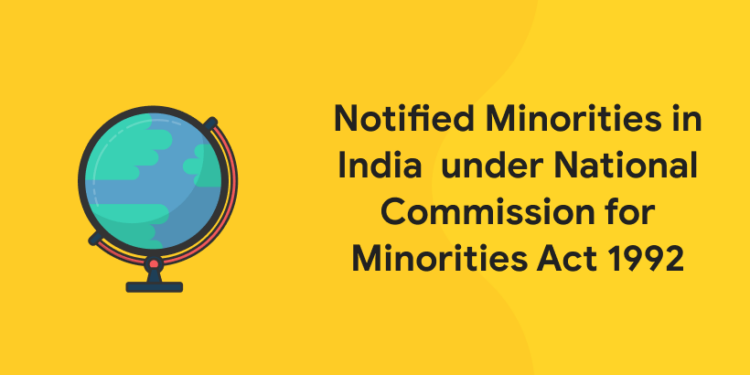Table of Contents
The Union Government established the National Commission for Minorities (NCM) under the National Commission for Minorities Act 1992. Six religious communities; Muslims, Christians, Sikhs, Buddhists, Zoroastrians (Parsis) and Jains have been informed in Gazette of India as minority communities by the Union Government all over India . Original notification of 1993 was for five religious communities; Sikhs, Buddhists, Parsis, Christians and Muslims, later in 2014, Jains community was also included. As per Census 2001, these six communities comprises of 18.8% of the country’s population.
UN Declaration
The NCM holds on to the United Nations Declaration of 18 December 1992 which declares that “States shall preserve the existence of the National or Ethnic, Cultural, Religious and Linguistic identity of minorities within their respective territories and stimulate conditions for the advancement of that identity.”
National Commission for Minorities Act 1992
1: Who was the first woman President of India?
Under the National Commission for Minorities Act, 1992 the government established the National Commission for Minorities (NCM) which comprises of Chairperson, a Vice-Chairperson and five Members. The five Members including the Chairperson shall be from amongst the minority communities.
Attempt Free GK Test! Download Entri App!
Free UPSKILLING Courses!
Take your first step toward mastering in-demand skills, acing interviews, and securing top-tier jobs with Entri's free upskilling courses.
Start Learning!Definition of minority
The act explains a minority as “a community notified as such by the Central government.”
Government of India has stated six religions namely, Muslims, Christians, Sikhs, Buddhist, Parsis and Jain (included in 2014) as religious minorities in India. Together they constitute 20.22 per cent of India’s population.
Constitutional provisions for minorities
Constitutional provisions linked to minorities can be seen in Fundamental Rights (FR), Directive Principles of State Policy (DPSP), and Fundamental Duties (FD).
Grab Latest Study Materials! Register Here!
Fundamental Rights:
- ARTICLE 14: people’s right to ‘equality before the law’ and ‘equal protection of the laws’
- ARTICLE 15: prohibition of discrimination against citizens on grounds of religion, race, caste, sex or place of birth
- ARTICLE 16: citizens’ right to ‘equality of opportunity’ in matters relating to employment or appointment to any office under the State – and prohibition in this regard of discrimination on grounds of religion, race, caste, sex or place of birth;
- ARTICLE 25: people’s freedom of conscience and right to freely profess, practice and propagate religion – subject to public order, morality and other Fundamental Rights;
- ARTICLE 26: the right of ‘every religious denomination or any section thereof – subject to public order, morality and health – to establish and maintain institutions for religious and charitable purposes, ‘manage its own affairs in matters of religion’, and own and acquire movable immovable property and administer it ‘in accordance with law’
- ARTICLE 27: the prohibition against compelling any person to pay taxes for promotion of any particular religion’
- ARTICLE 28: people’s ‘freedom as to attendance at religious instruction or religious worship in educational institutions’ wholly maintained, recognized or aided by the State.
Grab Latest Study Materials! Register Here!
Directive Principles of State Policy
DPSPs under Part IV comprises of the following provisions having important implications for the Minorities: –
- the obligation of the State ‘to endeavour to eliminate inequalities in status, facilities and opportunities’ amongst individuals and groups of people residing in different areas or engaged in different vocations; Article 38 (2)
- the obligation of State ‘to promote with special care’ the educational and economic interests of ‘the weaker sections of the people’ [Article 46]
Attempt Free GK Test! Download Entri App!
Fundamental Duties
Article 51A:
- citizens’ duty to promote harmony and the spirit of common brotherhood amongst all the people of India ‘transcending religious, linguistic and regional or sectional diversities; and
- citizens’ duty to value and preserve the rich heritage of our composite culture.’
Role of NCM
- The commission observes the working of the safeguards offered in the Constitution and in laws approved by Parliament and the State Legislatures.
- It also creates recommendations for the effective accomplishment of safeguards for the protection of the interests of minorities by the Central Government or the State Governments.
- Assessment of the progress of the development of minorities under the Union and States.
- Looking into particular complaints concerning deprivation of rights and safeguards of minorities and taking up such matters with the appropriate authorities.
- Undertaking research and study into the problems rising out of any discrimination against minorities and recommending measures for their elimination.
- Making special reports to the central government or any matter prevailing to minorities specifically the difficulties faced by them.
- Any other matter which may be referred to it by the Central Government.
- To mark the adoption of the “Declaration on the Rights of Persons belonging to National or Ethnic, Religious and Linguistic Minorities” by the United Nations in 1992, it observes the Minorities Rights Day every year on 18th December.
Free UPSKILLING Courses!
Take your first step toward mastering in-demand skills, acing interviews, and securing top-tier jobs with Entri's free upskilling courses.
Start Learning!Instances where NCM played a role
The 2011 Bharatpur communal riots were examined by the Commission. In 2012, a team was sent to Assam to inspect the Bodo-Muslim clashes, and their findings were submitted to the government.
NCM is an important institution for our country because it lets for revealing of minorities’ sorrows. Anyhow, it suffers from different problems.
National Commission for Minorities: Why in news?
The 7-member National Commission for Minorities (NCM) is down to just one member after the retirement of its vice-chairperson in October and the non-filling of 5 other seats since May 2020.
Attempt Free GK Test! Download Entri App!
Issues faced by the NCM
In a book titled Minorities Commission 1978-2015, Minor Role in Major Affairs authored by former NCM chairman Tahir Mahmood, NCM is mentioned to as a toothless tiger, white elephant, Sarkari puppet. It has been mentioned to as “National Commission for Tokenism” too.
- No constitutional status: NCM does not have a constitutional status (it is a statutory body) which if entrusted upon it would provide NCM autonomy and clout it needs to perform its functions efficiently.
- Absence of any constitutional power: It lacks the constitutional power to conduct independent inspections or investigations in cases of the crime of minorities’ rights, and particularly in cases of communal violence, carry out the Commission legally incapacitated to fulfil its duty. This restriction has also been specified in a recommendation in the Commission’s 2007-08, 2008-09, and 2010-11 annual reports of the Commission.
- Toothless tiger: It hasn’t been provided with any “teeth” in terms of their legal capacity to perform their Constitutional mandate. The decision of the Commission can be cancelled by the district and high courts.
- No reports tabled: Section 13 of the NCM Act instructs that the annual report, “together with the memorandum of action taken on the recommendations contained therein’’, as well as the reasons for non-acceptance of the recommendations be tabled before Parliament yearly. Sources said these reports have not been submitted in Parliament since 2010. Moreover, its recommendations are routinely refused or simply filed away and forgotten.
- Partisan representation: There has been a change in the kind of members selected to the body. While previous appointments included former chief justices, civil servants, academicians etc, the new appointees were mostly “social activists” with connection to the ruling party.
- Capacity related challenges: These human resource deficiency as is the case now. The Commission is not able to adequately fulfil its mandate when the key positions of Commission members remain vacant. For example, the Commission mandated to conduct hearing is unable to process the numerous cases it gets.
- Underutilization of technology: There is no real-time communication of schedules and appointments for hearings with the complainants that results in wastage of time and money.
- Only a few State minority commissions: A major recommendation of the Annual Conference of State Minorities Commissions (2008) was “that the State Governments should also set up State Minorities Commissions on similar lines (as that of the NCM).” Anyhow, only 16 states have set up such commissions. These too stay understaffed and mostly disfunctional because of lack of capacity in human resource and in the lack of a regular monitoring mechanism of the State Commissions’ functioning.
- Pressure on NCM: With inefficient State Finance Commissions, the pressure is borne by the NCM which further minimize its performance.
- Inadequate powers to State Minority Commissions: State Minority Commissions are not provided sufficient powers to execute, monitor, and review developmental programs and welfare schemes under the Prime Minister’s 15 Point Program for Minorities.
- Lack of research: Only a small portion of the allotted budget of the Commission is spent in research activities even when conducting “studies, research and analysis on the problems relating to the socio-economic and educational development of minorities” is among the primary directions of NCM.
Grab Latest Study Materials! Register Here!
Measures to make NCM more effective
- To lessen pendency of cases at the organizational level, the Commission should establish certain baseline goals related to the pendency rates.
- At uniform intervals, conducting a staffing requires evaluation that may be a useful solution to address the problem of vacant positions at the leadership level.
- NCM should develop a Stakeholder Satisfaction Survey for parties to anonymously offer feedback concerning how their appeal was prepared, disregarding the decision made.
- Technological upgrades involving investment in more sophisticated information management systems could help lessen the pendency rates of cases in the Commission such as e-hearing.
- The enhancing of the State Commissions and establishing new state-level commissions, where these do not yet exist, can help in diminishing the pendency rates and raising hearings’ effciciency of the Commission.
- NCM could achieve its tasks alloted in its mandate if the greater legal and constitutional authority is expanded to the Commission. The Commission could be more efficient if it has greater power to conduct independent investigation in cases of the transgression of rights of the minorities.
Grab Latest Study Materials! Register Here!
Functions and Powers of National Commission of Minorities Act
The functions of Commission are the following:
- Assess the progress of the development of Minorities under the Union and States.
- Observe the functioning of the safeguards provided in the Constitution and in laws enacted by Parliament and the State Legislatures.
- Make recommendations for the effective execution of safeguards for the protection of the interests of Minorities by the Central Government or the State Governments.
- Look into particular complaints about denial of rights and safeguards of the Minorities and take up such matters with the proper authorities.
- Case studies to be started into problems coming out of any discrimination against Minorities and suggest measures for their removal.
- Conduct studies, research and analysis on the problems regarding to socio-economic and educational development of Minorities.
- Recommend suitable measures in respect of any Minority to be undertaken by the Central Government or the State Governments.
- Make periodical or special reports to the Central Government on any matter regarding to Minorities and in specific the difficulties confronted by them.
- Any other matter which may be mentioned to it by the Central Government.
The powers of the Commission are the following:
- Calling and enforcing the attendance of any person from any part of India and evaluating him on oath.
- Need of the discovery and production of any document.
- Need of evidence on affidavit.
- Requisitioning any public record or copy thereof from any court or office.
- Providing commissions for the examination of witnesses and documents.
Grab Latest Study Materials! Register Here!
Composition of Commission
The act specifies that the Commission shall comprise of:
- a Chairperson,
- a Vice Chairperson and
- Five Members to be nominated by the Central Government from amongst persons of eminence, ability and integrity; provided that five members including the Chairperson shall be from amongst the minority communities.
Rights & Safeguards of Minorities
Although the Indian Constitution does not describe the word Minority, it has given constitutional safeguards and fundamental rights to minorities:
Under Fundamental Rights Part III of Indian Constitution
Indian state is committed to administer these rights which can be enforced by judiciary
- Right of ‘any section of the citizens’ to ‘conserve’ its ‘distinct language, script or culture’; [Article 29(1)]
- Right of all Religious and Linguistic Minorities to establish and administer educational institutions of their choice;[Article 30(1)]
- Freedom of Minority-managed educational institutions from discrimination in the matter of receiving aid from the State;[Article30(2)]
Under Part XVII Official Language of Indian Constitution
- Rights for any section of population for language spoken by them ;[Article 347]
- Provision for facilities of instruction in mother tongue ; [Article 350A]
- Provisioning a special officer for linguistic minorities and defining his duties ; [ Article 350B]
Attempt Free GK Test! Download Entri App!
Sachar Committee Report
On March 9, 2005 the then Prime Minister published a Notification for the constitution of a High Level Committee to make a report on the social, economic and educational status of the Muslim community of India. Recommendations consisted in the Report of the High Level Committee on Social, Economic and Educational Status of the Muslim Community of India led by Justice Rajindar Sachar (Retd.):
- Need for Transparency, Monitoring and Data Availability – Create a National Data Bank (NDB) where all relevant data for various socio-religious categories are maintained.
- Improving the Legal Basis for giving Equal Opportunities Set up an Equal Opportunity Commission to look into problems of deprived groups like minorities.
- Shared Spaces: Reqruired to Enhance Diversity: The idea of providing few incentives to a ‘diversity index’ should be explored.
- Education: a process of assessing the content of the school text books needs to be started to purge them of explicit and implicit content that may impart improper social values, specifically religious intolerance. Need to assure that all children in the age group 0-14 have access to free and high quality education.
- High quality Government schools should be established in all areas of Muslim concentration. Exclusive schools for girls should be established, especially for the 9-12 standards. This would promote higher participation of Muslim girls in school education. In co-education schools more women teachers need to be appointed.
- Give primary education in Urdu in areas where Urdu speaking population is concentrated.
- Mechanisms to link madarsas with higher secondary school board.
- Recognise degrees from madarsas for eligibility in Defence Services, Civil Services and Banking examinations.
- Expand employment share of Muslims, particularly where there is great deal of public dealing.
- Improving Participation in Governance: suitable state level laws can be enacted to assure minority representation in local bodies
- Make a nomination procedure to escalate participation of minorities in public bodies.
- Set up a delimitation procedure that does not reserve constituencies with high minority population for SCs.
- Improving Access to Credit and Government Programmes: Provide financial and other support to initiatives built around occupations where Muslims are concentrated and that have growth potential.
- Enhance participation and share of minorities, particularly Muslims, in business of regular commercial banks
- Enhancing Employment Opportunities and Conditions
The Committee suggested that policies should “mainly concentrate on inclusive development and ‘mainstreaming’ of the Community while respecting diversity.”
Hope this article was helpful. The key point to clear an exam lies in methodical and planned preparation. If you are a candidate who wants to pursue your dream career and looking for a good start, Entri App has got it covered for you. Our team will help you with content and insights related to the topics of your concern. Subscribe to our app today and enrol yourself into various programmes our app offers. Tune in to the app to stay updated regarding various aspects of the subject you are interested in. Feel free to post any queries and doubts in the comment section. We will try our best to reach out. Push away all those self-doubts and negative thoughts. Try to have a clear vision. Ask yourself why you want this. Focus on the good and work hard. There is a saying that goes like this, Get up and set your shoulders to the wheel-how long is life for you? as you have come to this world leave some mark behind or where is the difference between your trees and stones they too come into existence decay and die. Each day is a precious gift bestowed upon us so make it count. Work on yourself. Stop procrastinating. Today is the day, hope for the best. Good luck.













